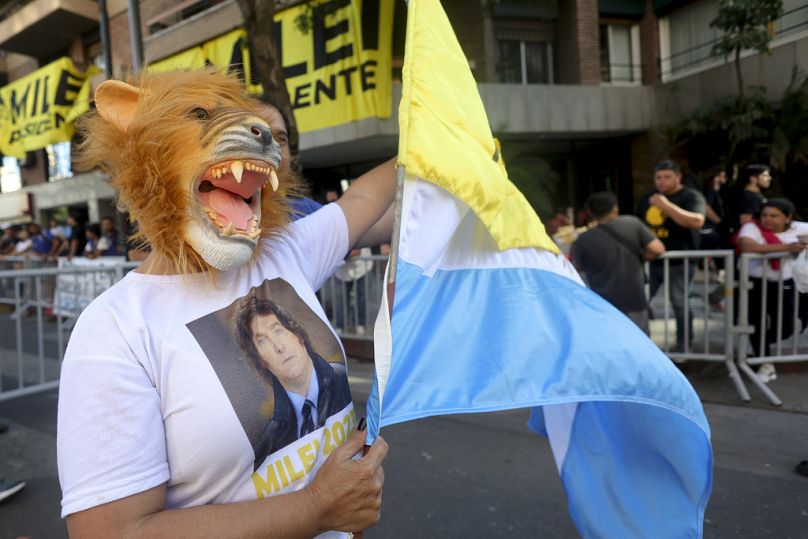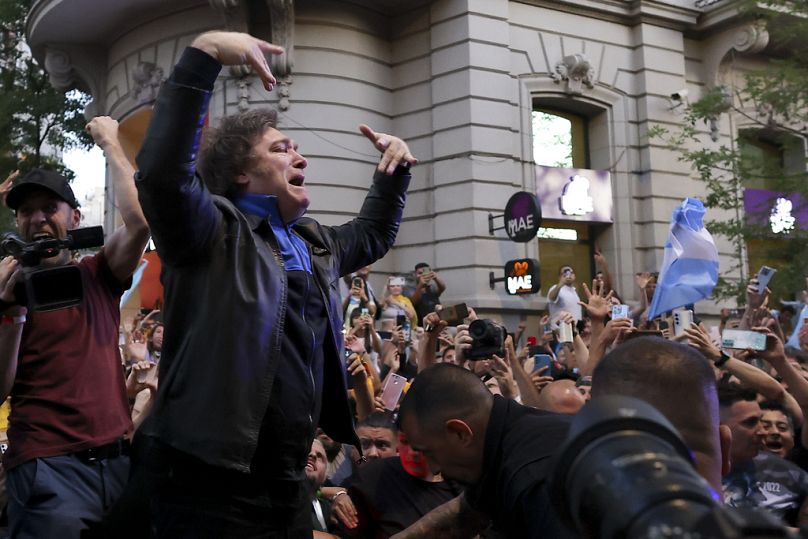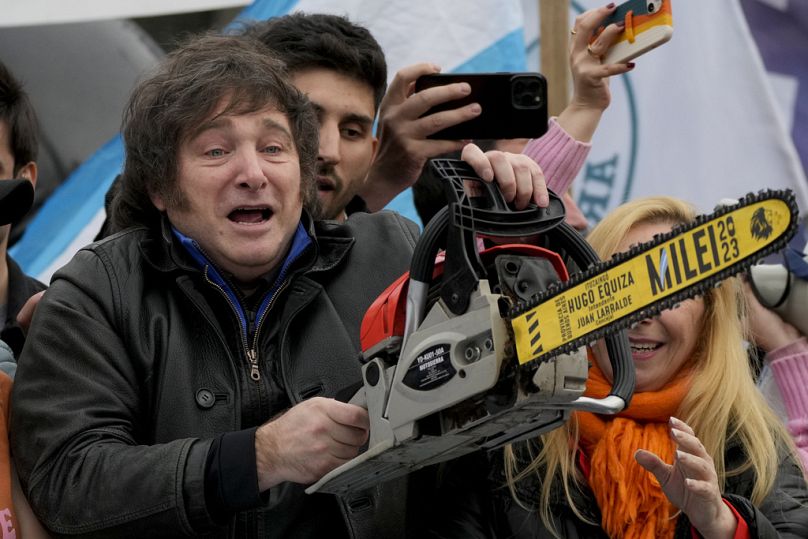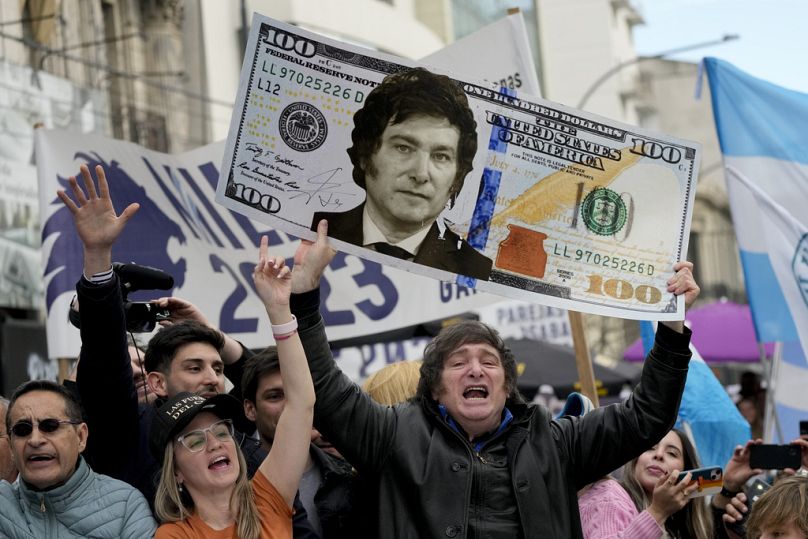
Europe’s far-right has welcomed the victory of the self-proclaimed “king of the jungle” who is stirring up Argentinian politics at a sensitive time for the Latin American country.
Batman and the Joker, a man decked out in a full-body lion costume, and another whose head and arms have been replaced by chainsaws. This wasn’t the Carnival or Comic-Con, but rather an outlandish campaign rally for Argentina’s new president, Javier Milei.
In just a few short years, the right-wing populist Milei went from being a television talking head who garnered high ratings with his unrestrained outbursts against a “political caste” he blamed for Argentina’s perennial economic woes, to the country’s new president.
The ultra-liberal economist who calls himself “the king of the jungle” has managed to achieve what others have not: to break into the dominant space between the Peronism of the ‘Frente de Todos’ party and the followers of former president Mauricio Macri, represented by the ‘Juntos por el Cambio’ party.
Hence, his motto: “I did not come to guide lambs, I came to awaken lions.”

Milei’s victory has been welcomed by far-right parties across Europe. Spain’s Vox party leader, Santiago Abascal, wrote on the social media platform X:
“Today a path of future and hope opens for Argentines and all of Latin America, which we celebrate in Spain with special joy.”
“Long live Spain, long live Argentina, live free of socialism and sovereign!”
Founder of Portugal’s far-right Chega party, André Ventura, congratulated Milei, writing that “the fight to defend society is taking place in several territories and in Argentina the first battle has been won!”
Matteo Salvini, Italy’s deputy prime minister and leader of the rightwing League also took to X to congratulate Milei and wish him good work.
Milei’s appeal seems to lie in his ability to channel the anger that Argentines feel against the ruling class amid red-hot triple-digit inflation and rising poverty. Year-on-year inflation in the country stands at 140%, while more than 40% of the population struggles to make it to the end of the month.
“He speaks like somebody from the street, like one of us, that’s why he is so popular”, says Rodrigo Agüera, an Argentinian waiter based in Barcelona.
“I am in favour of a change,” he says, but “we’ll have to see what happens after this, because in the end, politicians will always be politicians, they tell you one thing and then do another.”
From TV talking head to president
Once seen as a sideshow in Argentine politics, Milei managed to parlay his success as a talking head into a seat in the Chamber of Deputies, Argentina’s lower house of Congress, in 2021.
He then launched what looked like a long-shot presidential bid, but rocked Argentina’s political establishment when he received the most votes in the country’s August primaries, a national contest seen as a massive poll of voter preferences.
“He is a person who does not understand the political system. Neither electoral nor executive. He has no experience governing a city or a municipality. How do we expect him to govern a country?” said cultural management student Candela Kantor.
“He is surrounded by people he wants to put in charge of ministries, people who are closely linked to the worst crisis in Argentina,” she added.

Argentinians searching for an alternative
Milei was predicted to have an edge for the October poll, but finished second, with 30% of the vote, almost seven points below Economy Minister Sergio Massa.
Researcher Alan Ríos seems to think that the part of the population who voted for Milei “do not see themselves reflected in the current narrative, neither in Kirchnerism nor in Macrism.”
“They have lived through experiences with both types of government and nothing changed. In fact, it got worse,” he explains.
‘Yes’ to bodily autonomy, ‘No’ to abortion
Often called Argentina’s Donald Trump, Milei adopts a mixture of love for the ideals of capitalism with socially conservative policies, including an opposition to abortion, which Argentina legalised in 2020.
On the other hand, he is in favour of the free sale of firearms and human organs. “Why does everything have to be regulated by the state? My first property is my body,” he says.
Introducing the US dollar and shutting down the Central Bank are two of the measures he has promised along with the privatisation of state-owned public enterprises.
Some followers also used props to mimic the chainsaw that Milei has often held up at rallies to symbolise what he wants to do with state spending. The economist and dog-lover has been clear that there will be cuts on main social issues such as health, education and social development.
History teacher Luis Klejzer states that “he is a danger to democratic freedom and human rights.”

Historical memory in danger
Another point that has generated public debate is the new deputy president Victoria Villarruel.
Daughter of military officers, Villarruel is a lawyer who has spent much of her career defending military officers responsible for the human rights abuses committed during the extreme right-wing dictatorship of the late 1970s and early 1980s, which include the torture and disappearance of thousands of people by security forces.
“There is a large sector of society, the military families, people from military circles, people who are more right-wing, who are all involved in politics in Argentina and who until now have not had their place of representation,” explains Ríos.
“So Milei, by coming here and vindicating all these things, is also openly giving a place to all these people,” he adds.

According to Klejzer, the figure of Javier Milei “is able to channel all the discontent that this society carries. Especially among young people,” which he says the economic crisis is hitting very hard.
“They don’t see a future. So they are trying to get out of this situation via the extreme right.”
The history teacher from Buenos Aires says that Milei’s election as president means the loss of “the constitutional freedoms of our beloved Argentina.”

